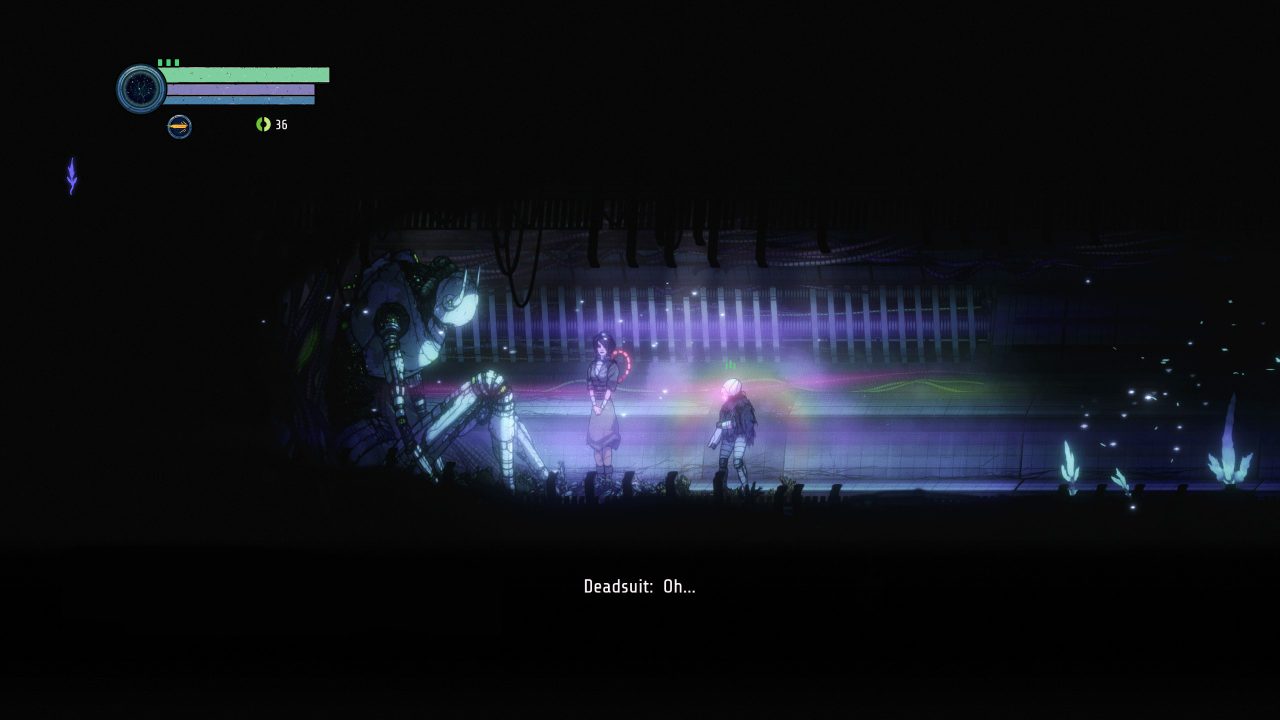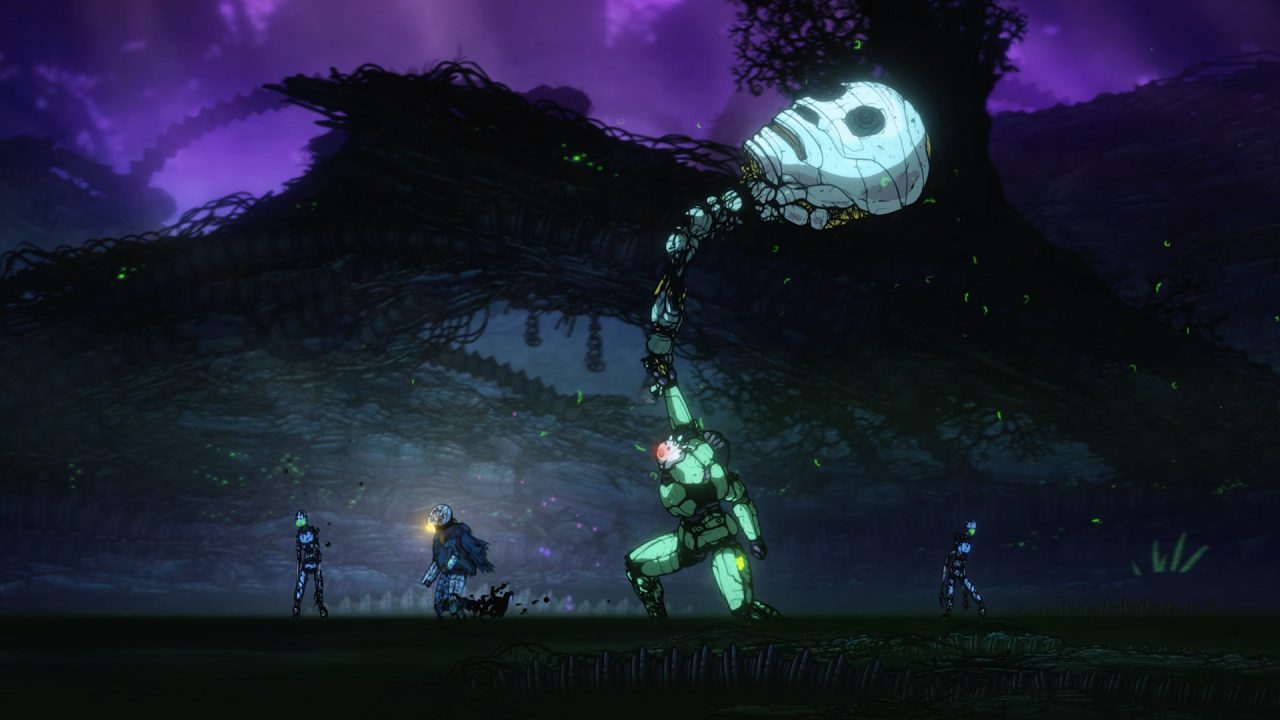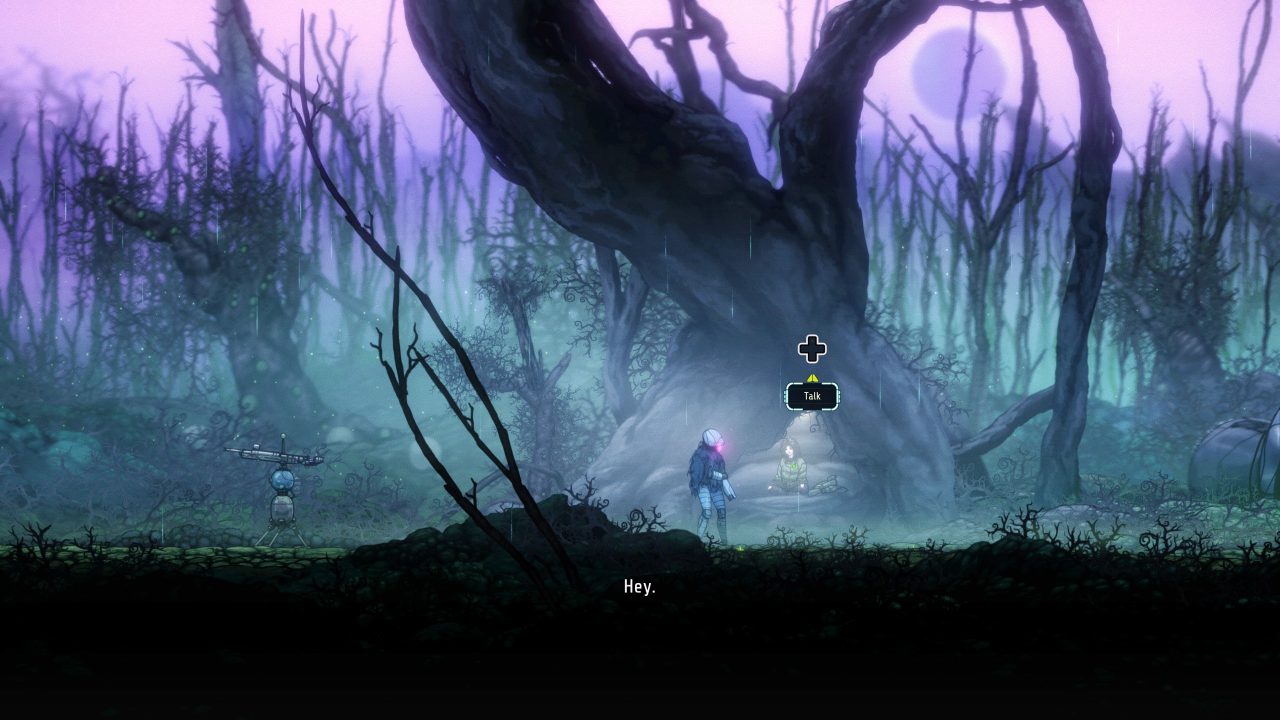In the weeks leading up to Ghost Song‘s multi-platform release, I was watching the trailers and muttering to myself, “hmm, this looks familiar.” And that’s when I remembered: this game originated from a Kickstarter campaign in 2013. I was one of the first 50 backers for this game, a project for which lead developer Matt White had set a funding goal of $15,000. White raised over $50,000 in this campaign. But, dear reader, I’d all but forgotten about this game. When I look at the 100 or so crowdfunding campaigns I’ve participated in, about 30% remain “undelivered” despite meeting funding goals, and anything that takes four or five years past its estimated completion date, I tend to let out a sigh of frustration and move on. I think many of us have learned our lesson and are crowdfunding more judiciously (and, similarly, developers have learned to set more realistic funding goals).
And yet, miraculously, it’s finally here. Eight years later, Ghost Song is a real game. I have not gone down the rabbit hole to better understand what, if any, additional funding allowed this passion project to come to light, though I do know the game is published by Humble Games (of Humble Bundle fame). This likely helped with porting and distribution from its original PC build to all current consoles. Beyond that, Ghost Song appears to be largely a one-person project, although Matt White’s brother, Gabe White, is credited for most of the story. Additionally, there are music, sound, and voice acting credits, plus two more programmers. However, the sense that the creative control is held in the hands of a sole individual is evident. One can perceive this when playing other indie darlings like To the Moon and Undertale.

Now that we’ve established that the game exists and that it took its sweet time getting here, it’s important to talk about what kind of game this is. Ghost Song is billed as a “Metroidvania” type of game. And, given the game takes place on the barren lunar landscape of Lorian V and our protagonist is a seeming amnesiac in a space suit with an arm cannon, first impressions suggest siding on the Metroid half. But don’t be fooled. While RPGFan as a site didn’t cover the popular Metroidvania title Hollow Knight (as it lacked typical character growth stats), we saw fit to cover Ghost Song because it leans heavily on familiar RPG character progression. Additionally, there is a “Souls-like” mechanic in that death will forfeit you all of the points, known as “nanogel,” accumulated up to that point (with a return-to-corpse mechanic to recover should it suit you). Furthermore, your suit’s max health is reduced until you recover that same nanogel. These Souls-style punishments can be avoided entirely by selecting an easier difficulty at the start of the game. I personally did not find it too great a penalty and recommend players keep this setting as-is.
So we have a game that kinda-sorta looks like Metroid but has experience points kinda-sorta like Castlevania: Symphony of the Night. And here is where we need to part ways with the somewhat overused subgenre moniker with these two games as their namesake. Ghost Song is a subversion of these 2D platforming action RPGs. It’s open-world and feels free-form, yet it operates on a chapter system. It seems desolate at first, with Deadsuit, the protagonist, having naught but undead monstrosities to interact with. But in time, players who choose to seek it out will be met with well-paced story reveals through dialogue with humans and other forms of life at the game’s peaceful “base camp.”
Combat feels straightforward at first, but the rhythms and patterns available to the player to swap between standard shots, special shots, and equipped melee weapons are many. As platforming action RPGs go, Ghost Song has proven to be the most rich and enjoyable experience I’ve had this decade. However, this comes with one big caveat. If you choose to play this game on the PC (as I did), do not attempt it with a keyboard. While the game allows the player to use a keyboard, a small warning on the title screen lets the player know that a dual analog stick controller is the ideal way to play. The Deadsuit is capable of aiming in 360 degrees while holding an “aim” button, and that does not translate well into keyboard inputs at all. Yes, there are plenty of times in the game where dashing through hallways and blasting missiles forward is all you need to do. But there are just as many occasions where the player must carefully approach a cliff edge and shoot an enemy at just the right angle to get that damage in before the enemy turns around and tears you to pieces.
Games built in the Unity engine allow for great versatility in graphic performance. There’s nothing groundbreaking from a technical level in Ghost Song‘s visuals, but the world Matt White built is visually striking, somehow managing the balance between cohesion and contrast. Everything in the game looks and feels believably like the sci-fi setting we know it to be: a moon with at least one lost civilization, exotic flora and fauna, and hidden research facilities that may or may not continue to function as intended. The first area explored, “Lupoto,” is a luscious green area with caverns just below the moon’s surface. Later in the game, the player will find “Six Finger Woods,” which I will only describe as nightmarish. The horror element is not lost for one second in this game.

The push-and-pull that makes this game and others like it so exciting is the big challenge followed by the big reward. Of course, it’s not always as simple as killing a big boss and getting the cool upgrade. Sure, that happens as well! But Ghost Song also rewards players for taking long treks without a save point or completing the main quest “part retrieval” missions, where the player cannot use Fast Travel, and a certain type of enemy becomes active and chases the player back to base camp.
There is more to say about the game from the aspects of mechanics and control. I may not be skilled enough to explain it all, or perhaps there is so much joy in some of the discoveries that I’d rather not spoil even this aspect of what is possible in Ghost Song. So I’ll leave it at this: it’s fun, feels fun to play, and handles extremely well. The learning curve is a tad steep, but within about an hour, I felt like I was fully in control of the Deadsuit.
I want to talk about the game’s audio. I have plenty to say about the soundtrack (click link for greater detail); in this game review, I will simply say that composer Grant Graham has demonstrated—in his first game soundtrack—that he can balance the acoustic-electronic soundscape every bit as well as Jim Guthrie did in the iconic masterpiece soundtrack for Superbrothers: Sword & Sworcery. The implementation of the music alongside the many sound effects co-occurring during exploration and combat is top-notch. And the voice acting? Don’t get me started. Though not every line of dialogue is voiced, those that are stand out particularly well. And the lead voiceover artist, Su Ling Chan, brings so much life and personality to the Deadsuit! Her approach to the character suggests that she took time to sufficiently understand who, or what, the Deadsuit really is.

And it’s this last point—who is this Deadsuit?—that brings me to considering the game’s plot. Yes, amnesiac protagonists are an overused archetype. But, just like many other aspects of Ghost Song, this archetype is subverted. I do not wish to spoil or even make a conjecture about what is going on (because even I’m not sure I have all the answers after digging through the game’s many secrets beyond the main plot). I do know this, however: whatever else is going on with the Deadsuit, her(?) lack of memory is not the sort of “convenient amnesia” story-telling you might think it to be. The protagonist’s own story seems to play second fiddle to the story of everyone and everything else past, present, and future. The story’s scope is enormous, with clear potential for DLC episodes or even a sequel. Even so, it may be that Deadsuit is more than merely caught up in the troubles of Lorian V.
The wait was worth it: Ghost Song is a compelling, challenging, and joyously fun game whose craftsmanship shows itself at every turn. The meta-story of this game is that, like a lost civilization, we’re collectively unearthing something ancient, something forgotten, a story that could’ve been lost as so many others were in the early days of crowdfunding indie games. Given its ubiquity across current platforms, there are many options for the seasoned gamer to try out Ghost Song. I look forward to the weeks and months ahead, wherein players will no doubt begin theorizing about the game’s story. Like many in its subgenre, I also think this game will be an optimal space for the speedrunning community to flex their skills. I look forward to it, and hope that this isn’t the last we see of Ghost Song and the Deadsuit.




